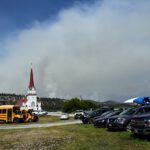Home »

GSAR callouts have surged during the pandemic
British Columbia’s ground search and rescue (GSAR) groups have just wrapped up the busiest year in B.C. GSAR history.
As COVID-19 restrictions pushed people to explore outdoors, it also drew GSAR groups out to a record number of requests to assist the public.
Between April 2020 and April 2021, B.C.’s GSAR groups were deployed 1,959 times. This is an increase of nearly 25% when compared to callouts in previous years. Prior to this, B.C.’s GSAR groups attended an average of roughly 1,500 responses annually – more than the rest of Canada combined.
“B.C.’s 79 GSAR groups have been pushed to their limits,” said Chris Kelly, president, BC Search and Rescue Association. “COVID-19 has made risky work even more dangerous for each individual. I implore anyone heading out into the elements to do their part by planning ahead. Make sure you’re prepared for where you’re going – have a plan, have the right gear, know how to use it and take the training.”
“Our search and rescue volunteers in B.C. are world class, and they’ve continued to prove that through the challenge of a global pandemic,” said Mike Farnworth, Minister of Public Safety and Solicitor General. “They jump into action in dangerous circumstances and inclement weather to protect public safety, and COVID-19 has only made their jobs harder. It’s our duty as British Columbians to protect them by ensuring we’ve taken safety precautions and are well-prepared for the unexpected when heading into the backcountry.”
It is important to prepare for the unexpected when heading outdoors, regardless of weather, a joint Ministry of Public Safety and Solicitor General and Emergency Management BC media release stated.
While spring begins to arrive in some of B.C.’s valleys, winter conditions persist in the alpine. Tragically, there were ten avalanche fatalities in B.C. in the last year.
“B.C.’s GSAR groups have done tremendous work over this past year,” said Jennifer Rice, Parliamentary Secretary for Emergency Preparedness. “The best way to show your gratitude is to make sure you are prepared for your outdoor adventure. Even if you think it will be a short trip, it’s important to let someone know where you’re going, investigate the terrain and weather conditions beforehand, and bring supplies for an unexpected overnight.”
It is critical not only to be prepared before venturing into B.C.’s mountains and trails, but also to call for help immediately if needed. BC AdventureSmart advises people follow the “Three Ts”: trip plan, train and take the essentials.
In addition, Avalanche Canada has extensive resources on its website, including information about avalanche conditions, terrain and an online avalanche tutorial, Avy Savvy.
e-KNOW







